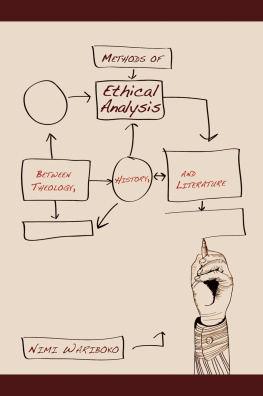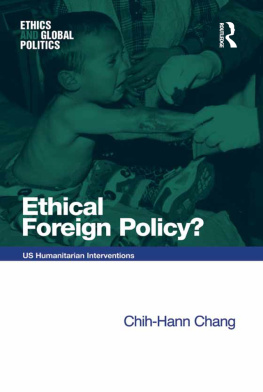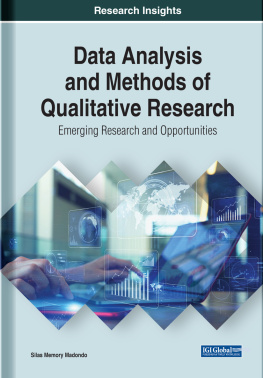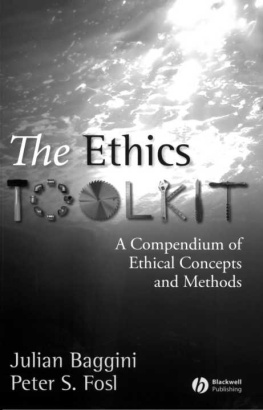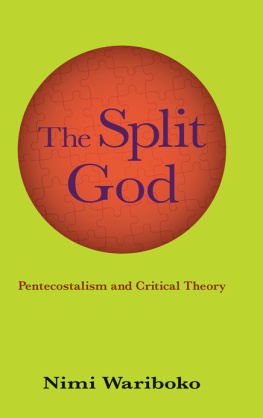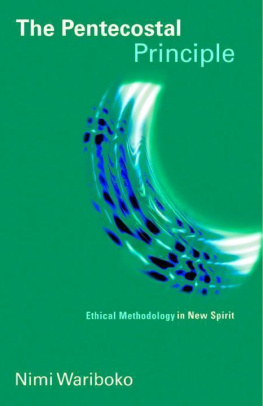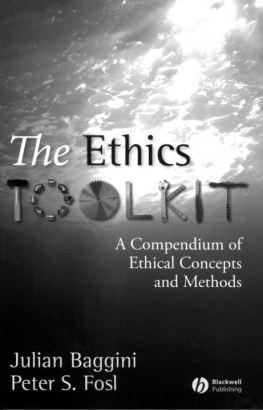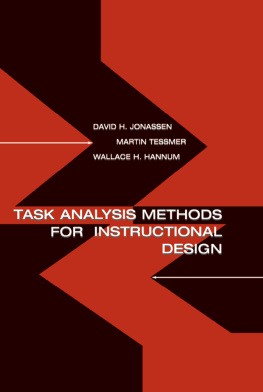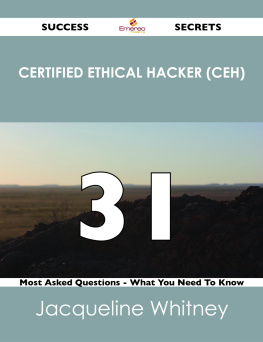Wariboko - Methods of Ethical Analysis
Here you can read online Wariboko - Methods of Ethical Analysis full text of the book (entire story) in english for free. Download pdf and epub, get meaning, cover and reviews about this ebook. year: 2013, publisher: Wipf & Stock Publishers, genre: Romance novel. Description of the work, (preface) as well as reviews are available. Best literature library LitArk.com created for fans of good reading and offers a wide selection of genres:
Romance novel
Science fiction
Adventure
Detective
Science
History
Home and family
Prose
Art
Politics
Computer
Non-fiction
Religion
Business
Children
Humor
Choose a favorite category and find really read worthwhile books. Enjoy immersion in the world of imagination, feel the emotions of the characters or learn something new for yourself, make an fascinating discovery.
- Book:Methods of Ethical Analysis
- Author:
- Publisher:Wipf & Stock Publishers
- Genre:
- Year:2013
- Rating:3 / 5
- Favourites:Add to favourites
- Your mark:
- 60
- 1
- 2
- 3
- 4
- 5
Methods of Ethical Analysis: summary, description and annotation
We offer to read an annotation, description, summary or preface (depends on what the author of the book "Methods of Ethical Analysis" wrote himself). If you haven't found the necessary information about the book — write in the comments, we will try to find it.
Wariboko: author's other books
Who wrote Methods of Ethical Analysis? Find out the surname, the name of the author of the book and a list of all author's works by series.
Methods of Ethical Analysis — read online for free the complete book (whole text) full work
Below is the text of the book, divided by pages. System saving the place of the last page read, allows you to conveniently read the book "Methods of Ethical Analysis" online for free, without having to search again every time where you left off. Put a bookmark, and you can go to the page where you finished reading at any time.
Font size:
Interval:
Bookmark:
Between Theology, History, and Literature
Nimi Wariboko

Methods of Ethical Analysis
Between Theology, History, and Literature
Copyright 2013 Nimi Wariboko. All rights reserved. Except for brief quotations in critical publications or reviews, no part of this book may be reproduced in any manner without prior written permission from the publisher. Write: Permissions, Wipf and Stock Publishers, W. th Ave., Suite , Eugene, OR 97401 .
Wipf & Stock
An Imprint of Wipf and Stock Publishers
W. th Ave., Suite
Eugene, OR 97401
www.wipfandstock.com
ISBN : -- 62564 -
EISBN 13: 978-1-62189-622-7
Manufactured in the U.S.A.
To a dear friend, General Owoye Andrew Azazi, who passed away in December 2012 .
I would like to thank Professor Amos Yong of Regent University for his comments on the introduction and chapter . Nancy Shoptaw served as superb copyeditor, ferreting out errors with excellence and smoothing the flow of language. I also thank Christian Amondson, Jim Tedrick, and Diane Farley at Wipf and Stock Publishers.
I gratefully acknowledge permission to reprint three essays published elsewhere. Chapter published as Ethical Methodology: Between Public Theology and Public Policy. Journal of Religion and Business Ethics , no. (Winter 2010 ). Chapter appeared earlier as Emergence and Science of Ethos: Toward a Tillichian Ethical Framework. Theology and Science , no. (May 2009 ) . Copyright 2009 by Taylor and Francis. All rights reserved. Reprinted with the permission of Taylor and Francis Ltd. Finally, chapter appeared as The Evasion of Ethics: Peter Paris feels the Spirituals. Toronto Journal of Theology , , no. ( 2011 ) .
This book is a tutorial in ethical analysis and reasoning. Master of divinity students will be brought into the finer points of ethical analysis, of mastering the ins and outs of ethical methodology, by immersing themselves in critical social-ethical analyses of prominent scholars in the American academy. Students will be guided toward how to develop their own voice in social issues, hone their capability in social analysis, and critically engage the social sciences, history, philosophy, and literature as they embark on ethical analyses. There is no single way of teaching the methodology of social ethics and no single theory of ethics that satisfies all, therefore ethics and its methodology are better understood by enabling students to view the field through multiple windows. Simultaneously they will learn to view social reality from different perspectives. The seven chapters of this book explore the different ways American ethicists have interrogated their nations moral systems or crafted methods for understanding them.
The very first chapter is a distillation of what I believe is the most prevalent methodology of social ethics in the American academy. It paints a portrait of ethical methodology in the academy. This portrait of ethical methodology in the academy serves as a frame or space through which the thoughts of the five scholars in the remaining chapters are seen. In addition, the chapter provides a lens through which to see their orientations and to appropriate their perspectives.
Chapters investigate the work of five scholars: Jeffrey Stout, Max Stackhouse, Paul Tillich, Peter Paris, and Martha Nussbaum as exemplars of ethical methodology. In choosing these ethicists/theologians from a long list of well deserving scholars, I make no claims that they are the single most important ones to study. For our purposes, they represent five distinctive approaches to doing ethics and are representatives of different schools of thought. They were chosen also for the perspectives they bring on different social issues, trends, and events of our times. Indeed their works not only elucidate social issues, they also develop frameworks, procedures, and protocols for navigating and appreciating the diversity of voices, perspectives, experiences, and the kinds of knowledge that stake claims in the public square.
Above all, they were chosen because of the fundamentally different issues of ethical methodology they bring to the field and the public square. Each ethicist challenges students or scholars to examine how they interpret reality and the methods they bring to such an exercise. Thus, the works of these five scholars are part of an ongoing dialogue on methodology.
Some words of caution are in order at this juncture. None of the five scholars set out explicitly to write on ethical methodology. They had other tasks in mind, and whatever methodology I have culled from their works is based on my own reading and my interest in showing seminary students how every ethical analysis supervenes on or provides a window on methodology.
One other thread that holds these five scholars together is that their works demonstrate how ethical reasoning is not a form of scientific understanding. Each articulates different aspects of a coherent picture of ethical deliberation. Each is concerned with articulating the notion of the good human functioning that dynamically perfects or completes human life in a community.
To start, Jeffrey Stout examines the nature of public reason that guides ethical deliberation and moral judgment in a democratic public domain. Max Stackhouse argues that to understand globalization we must describe it with the concreteness of historical details, missing nothing of its Christian-spiritual shading and relevance. By this move, Stackhouse is not reducing ethics to history or historiography, but asking us to see ethics as a high type of vision of a particular trajectory of Christian narrative or as meeting of the new of todays globalization with the responsiveness and imagination of the prophets of New Jerusalem. The interpretation of Paul Tillichs ethics via the lens of emergence shows that the subtleties of complex ethical situations suggest we ought to reject calculative, systematic scientific understanding as the best method of ethical reasoning. The chapter on Peter Paris explicitly interprets his work from the perspective of the elimination of racism in the United States as necessary for good human functioning of all persons. Martha Nussbaum, working from an Aristotelian conception of the ethical, offers an alternative scientific understanding of ethical reasoning, the perceptive equilibrium . This is an equilibrium in which concrete perceptions hang beautifully together, both with one another and with agents general principles; an equilibrium that is always ready to reconstitute itself in response to the new.
The thoughts of these five scholars in chapters - are arranged in two parts. In the first part I group together the more philosophic/theological (abstract and generalized) approaches to ethical methodology. This means approaches to ethical methodology that are not to specific social issues or social location but can be applied to any issue or location that is at stake. Here I start with Stout with a generalized American focus on public reason; moving to Stackhouse in chapter with a global focus on the providential movement of history, and ending with Tillich (chapter ) on his global philosophic (metaphysics) argument and its connection to science of emergence. These three philosophic-theological arguments, as good as they, are not useful for all things and they tell us only half of the story. We need to complement them with more concrete methodological options. For the ethical methodology that I have laid out in chapter combines both philosophical-theological and concrete-particular approaches to ethics. The last two of the five chapters illustrate what the ethical methodology looks like in particular, concrete moral contexts. The first of these two chapters examines the concrete context of racism in the United States. The other shows how novelists attention to the particular and concrete enriches our understanding of the vision of the ethical methodology. In part two I bring together the works of Paris and Nussbaum in chapters and respectively. Paris reveals the relevance of the particular African-American narrative context and the experience of racism in the study of ethics in the United States. From Nussbaum we will learn the importance of particular literary approaches to ethics. This sequence is informed by the need to start the learning process from the very philosophical issues of public reason, to encompassing concerns of theology of history, to the benefits of multidisciplinary perspectives that science brings to social ethics, to the contextual issues of racism in the United States, and finally literature as particular aid to public reasoning in particular, concrete situations.
Font size:
Interval:
Bookmark:
Similar books «Methods of Ethical Analysis»
Look at similar books to Methods of Ethical Analysis. We have selected literature similar in name and meaning in the hope of providing readers with more options to find new, interesting, not yet read works.
Discussion, reviews of the book Methods of Ethical Analysis and just readers' own opinions. Leave your comments, write what you think about the work, its meaning or the main characters. Specify what exactly you liked and what you didn't like, and why you think so.

